|
The Story of William and Clara
Douglas
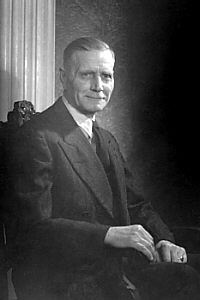 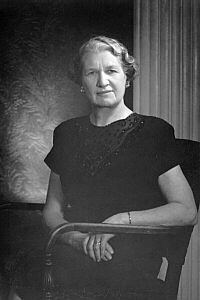
William Wallace Douglas was
born in Warkworth, Ontario on April 12, 1884. He took studied business
by attending Albert College in Belleville, Ontario.
Will came west in 1906.
He worked in a hardware store in McTaggart owned by Tom Moffat. While there
he met Clara (Bessie Ida Maud) Shaw, the only offspring of Albert
and Edith Shaw who had a homestead 4 miles north of McTaggart. Later
he ran a hardware store in Moose Jaw.
Clara was born in Norfolk
County, Ontario on August 27, 1883. The family moved to Saskatchewan in
1899. She returned to Ontario to attend Alma College, graduating in its
semi jubilee year of 1906.
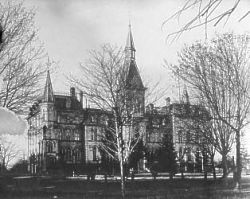 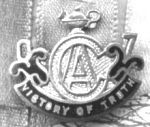
After graduation Clara
worked for the Government of Saskatchewan in Regina.
On October 14, 1911 Will
and Clara were married at the Palliser Hotel in Calgary. Mysteriously,
there are no pictures of this wedding. However, Clara's wedding dress stayed
in the family. Below is a picture of it being modelled by her great grandaughter
Leah.
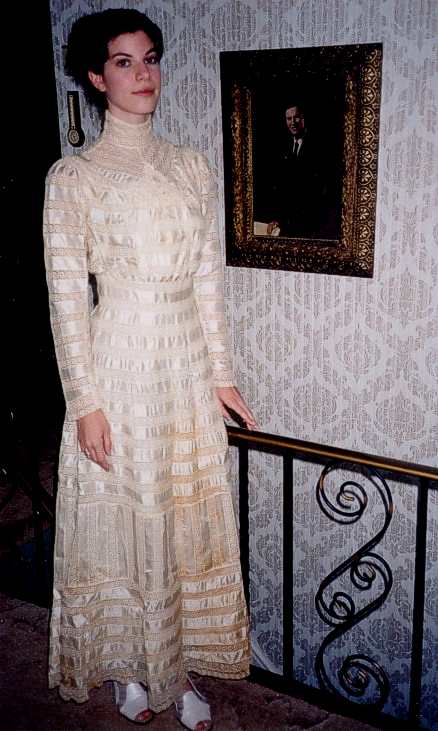
In 2002 the dress and the picture were donated to
the Briercrest Museum along with the following dedication:
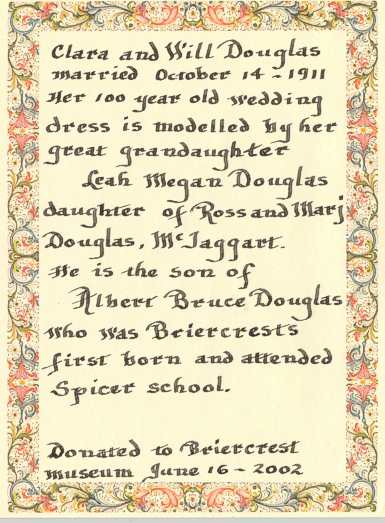 Will and Clara moved to Briercrest
in 1912 where they built a hardware store, one of the first buildings in
Briercrest. The stationery read:
Will and Clara moved to Briercrest
in 1912 where they built a hardware store, one of the first buildings in
Briercrest. The stationery read:
"Hardware, Paints, Oils,
Glass, John Deere and Goods"
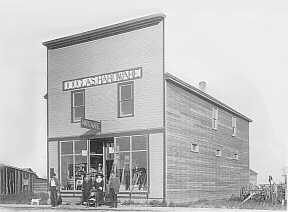
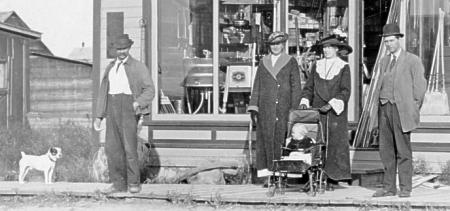
The first baby born in Briercrest
was their first son Albert, in the carriage above, born in 1912. Also in
the picture above from left to right: Dog (might be named Buster),
Albert H. Shaw, Edith Shaw, Clara Douglas and Will Douglas.
A few years later they
sold the hardware store and bought a farm two miles west and four miles
north of town. The remaining four sons Don, Jack, Elmer and Murray were
born there.
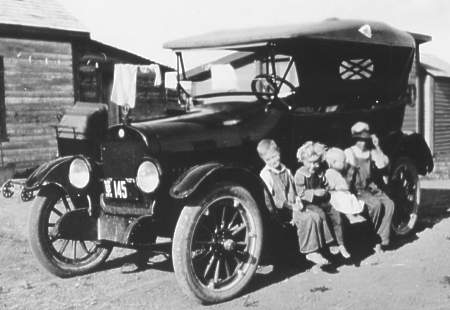
Don, Jack, Elmer and
Albert on the 1919 Record
The following commentary
is that of son Don when in his 80s:
"I am quite aware
of the struggle they had. The income they received from this farm was used
completely to maintain their ownership of it. Just about every bit of food
we ate was produced in this farmyard or grown in the garden. As time went
by it seemed a large scheme or system sort of evolved.
The chickens laid eggs,
some we ate and some we hatched and grew to fryers and roasters. The same
went for turkeys and geese too.
We milked the cows and
grew their calves for beef. We raised pigs for pork, and cured hams and
bacon.
The seeds we planted grew
into vegetables for the table.
The cattle herd had to
be large enough to produce more milk than we needed for food. The surplus
milk was put through a separator to get cream that was churned by hand
into butter.
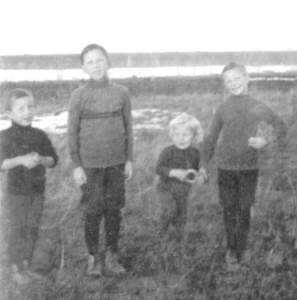
When a surplus
of butter was produced it would be done up in 1 lb. packages and wrapped
in a special paper called butter paper.
Surplus butter and eggs
were taken to the local grocery store where the store keeper would issue
a credit to be used for the purchase of some raw materials such as flour,
sugar and rolled oats to be used in the kitchen. These often came in large
heavy cotton 100 lb. bags.
These efforts were done
more or less on a daily basis with water pumped by hand from a well and
carried in pails, two at a time, to the kitchen. There was no running water,
electricity or plumbing on the farm.
I marvel at how my mother,
an only child, actually coped with the task of raising five boys with the
skimpiest of everything she needed. I cannot remember going to bed hungry.
Sometimes I know it was only a bowl of broken up slices of home made bread
covered with milk, and if that wasn’t enough there was always more."
Here are two letters
from Will to his parents John H and Clara after they had returned to Toronto
from their time farming in Pasqua Sask:
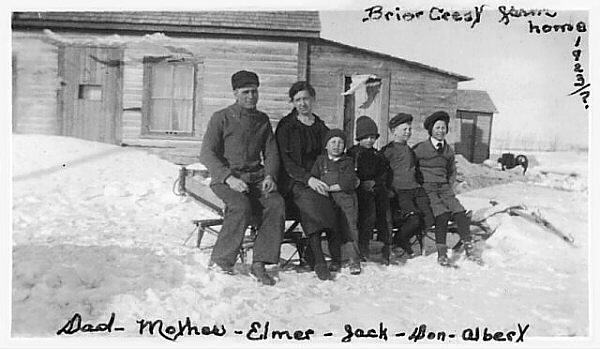
At the end of 1930 Albert,
who by then was homesteading in Peace River, Alberta, and Don were offered
their their Grandfather’s established farm near McTaggart. Albert drove
an open car on December 31, 1930 and Don rode a horse the 60 miles from
Briercrest on January 1, 1931. Brother Jack joined them in June after the
school year was over and became the cook.
Will and Clara remained
on the Briercrest farm until the 1934 when the world wide depression and
drought forced them to sell the farm and move in with their sons near McTaggart.
They moved to Weyburn in 1940.
NOTE: Construction of rural
power lines began in the late 1940s in Saskatchewan, fifty years after
the arrival of the first pioneers. A few rural homes had been electrified
prior to this on an individual basis. Each home would be powered by either
an gasoline fueled engine driving a generator, or a "wind charger", a generator
mounted on a tower driven by a propeller that rotated when there was sufficient
wind speed.
The 5 sons of Will &
Clara Douglas
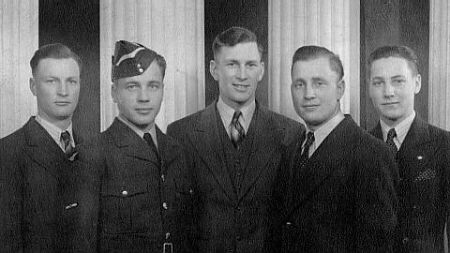
Don, Jack, Albert, Elmer & Murray
in about 1941
-
Albert had four sons,
farmed and went on to become a Member of Parliament for the constituency
of Assiniboia in the Trudeau government in 1968. He died suddenly from
a blood disorder three years later in 1971 while still in office.
-
Don farmed, had two
sons and retired to Weyburn. He died with double pneumonia in 2005.
-
Jack joined the airforce
and eventually located in Campbellford, Ontario where owned an ESSO service
station, raised three sons and two daughters. He died suddenly from a heart
defect in 1975.
-
Elmer lived on his
farm near Gleichen, Alberta where he raised two sons and a daughter. He
died when his pick up truck rolled in 2004.
-
Murray raised one son
in Montreal and is a Professor of Chemical Engineering at McGill University.
The picture below was taken
in about 1950 when Will and Clara travelled to eastern Canada to visit
Will's brother Ross in Campbellford, ON. Also appearing are son Albert,
his wife Chrissie and their son Ross.
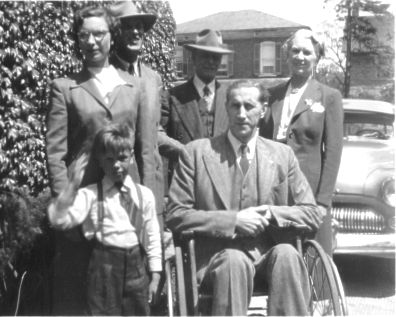 When Will and Clara moved
to Weyburn in 1940 they lived at 13 Bison Avenue. In the early 50s their
sons and some friends built them a new house at 307 Second Street. Will
operated a coal outlet on Reilway Avenue for a time. There are numerous
packages of safety matches bearing the North Star Oil Limited logo, promoting
William Penn Motor Oil with W. W. Douglas, 307 Second Street, Weyburn printed
on them.
When Will and Clara moved
to Weyburn in 1940 they lived at 13 Bison Avenue. In the early 50s their
sons and some friends built them a new house at 307 Second Street. Will
operated a coal outlet on Reilway Avenue for a time. There are numerous
packages of safety matches bearing the North Star Oil Limited logo, promoting
William Penn Motor Oil with W. W. Douglas, 307 Second Street, Weyburn printed
on them.
The picture below was taken
in May 1958 at his son Elmer's farm. It is perhaps the last picture ever
taken of Will. Left to right: Elmer, his daughter Marsha, Clara, Will
and Elmer's first son Murray. Behind them is Will and Clara's 1954 Ford.
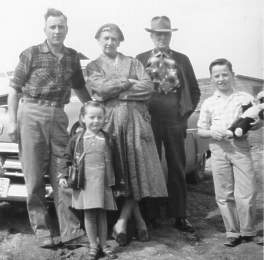 Will suffered from tongue
cancer and died October 8, 1958 of heart failure at age 74. The picture
below was taken after the funeral.
Will suffered from tongue
cancer and died October 8, 1958 of heart failure at age 74. The picture
below was taken after the funeral.
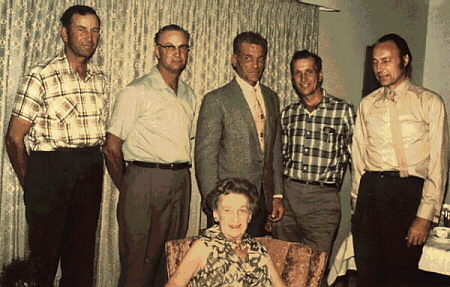 Clara travelled extensively
after Will's death. She was a very well read, knowledgeable and sophisticated
lady. She continued to live in the house they built on Second Street until
her death in 1975. She died in that house during an asthma attack.
At age 92 she had been working in the back yard earlier that day.
Clara travelled extensively
after Will's death. She was a very well read, knowledgeable and sophisticated
lady. She continued to live in the house they built on Second Street until
her death in 1975. She died in that house during an asthma attack.
At age 92 she had been working in the back yard earlier that day.
© Copyright
BWD 1999. All Rights Reserved
|














